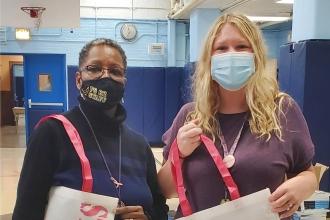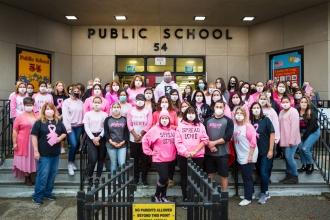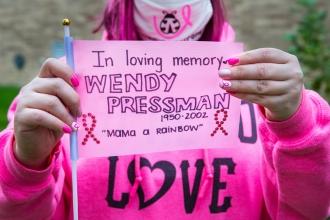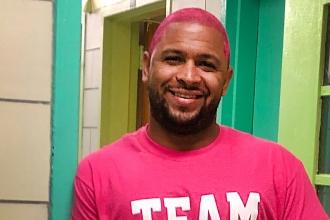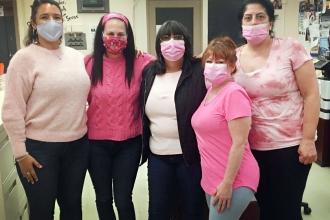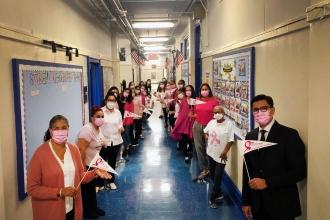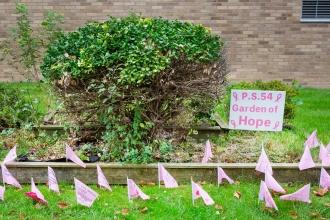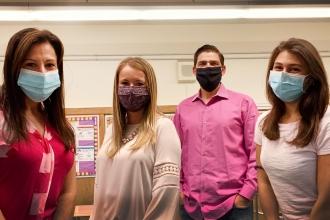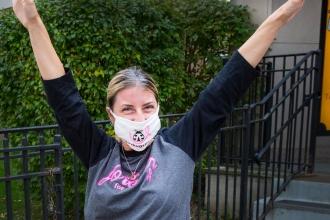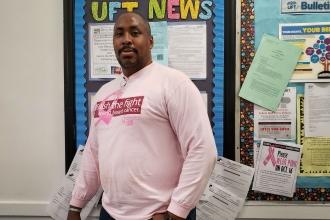Virus Can't Slow Strides

The staff at PS 54 on Staten Island show up for Breast Cancer Awareness Day.

Staten Island’s IS 24 counted down to its fundraising deadline.
“Cancer does not stop because of COVID,” said Liz McCabe, a teacher at PS 37 on Staten Island. And COVID-19 has not stopped UFT members from fighting for breast cancer awareness.
For the past 10 years, a team from PS 37 has participated in the Making Strides Against Breast Cancer walks sponsored by the American Cancer Society to raise funds for breast cancer research, advocacy and patient services.
This year’s fundraising walks were canceled due to the pandemic. Instead, the American Cancer Society organized a variety of smaller virtual events during October.
McCabe said it was harder this year to mobilize members on the issue, but “you fight every way you know how.” Before the coronavirus hit, the team organized a Krispy Kreme donut sale at school to raise funds to fight breast cancer; McCabe ended up hand-delivering the orders after the school building closed.

UFT members at P396, Brooklyn, are focused on fighting breast cancer.
Servia Silva, the UFT’s Making Strides coordinator, said she’s “appreciative that UFT members are continuing to bring breast cancer awareness to students and families because it’s not easy.” Schools across the city, she said, have had to rethink how they do their fundraising this year because of the pandemic.
Lisa Pressman, a teacher at PS 54 on Staten Island who lost her mother to breast cancer, used the GooseChase app to organize a digital scavenger hunt to raise funds. Challenges included answering Staten Island trivia questions and having students snap photos of themselves wearing personal protective equipment.
Christopher Rogers, the chapter leader at IS 24 on Staten Island, said breast cancer has had a profound impact on his school — several staff members have beaten the disease. The school organized a clothing sale this fall with T-shirts and hoodies bearing the message: “In this school, no one fights alone.”
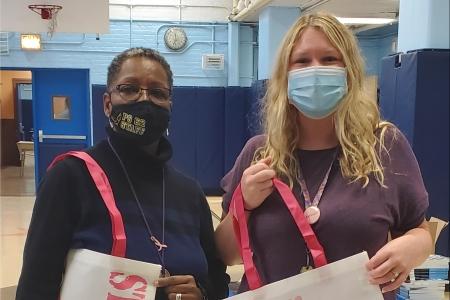
Staffers at PS 62 in the Bronx are equipped for the fight.

PS 54’s Lisa Pressman honors her mom, who died from the disease.
Kim Schuler, the chapter leader at P396 in Brooklyn, planned breast cancer awareness activities in classrooms, including reading books about the disease, making ribbon collages and creating a pink-themed snack cart for donations.
“The more people are aware of cancer, the more willing they are to go to the doctor and get checked out for early detection,” Schuler said, “so they can live long, fulfilling lives.”
